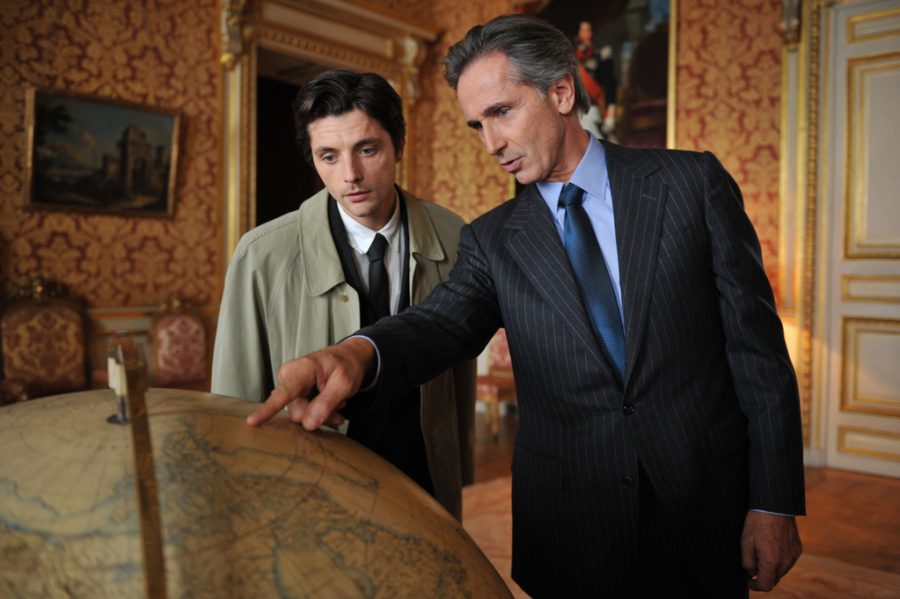
 Taking a break from the world of drama, and coming fresh off a 16th century period piece, Bertrand Tavernier tests his hand in the world of comedy. “The French Minister”, adapted from the comic book "Quai d'Orsay”, is a whimsical political satire, which never loses sight of its realist tendencies. A transparent parody of the US-Iraq conflict, substituting Iraq for the fictional country of Lousdemistan, “The French Minister” depicts the life of Arthur Vlaminck, the freshly hired speechwriter for the French minister Alexandre Taillard de Worms. Throughout the film Arthur is consistently hurled through a sea of endless rewrites and bureaucratic minutia, all the while, balancing the verbose personalities of the diplomats with whom he is forced to work with.
Taking a break from the world of drama, and coming fresh off a 16th century period piece, Bertrand Tavernier tests his hand in the world of comedy. “The French Minister”, adapted from the comic book "Quai d'Orsay”, is a whimsical political satire, which never loses sight of its realist tendencies. A transparent parody of the US-Iraq conflict, substituting Iraq for the fictional country of Lousdemistan, “The French Minister” depicts the life of Arthur Vlaminck, the freshly hired speechwriter for the French minister Alexandre Taillard de Worms. Throughout the film Arthur is consistently hurled through a sea of endless rewrites and bureaucratic minutia, all the while, balancing the verbose personalities of the diplomats with whom he is forced to work with.
The film is an absolute pleasurable viewing experience that places the viewer in rapid succession of loosely connected vignettes. Lacking the typical story structure, the film rather invites the viewer into the world of diplomacy and bureaucracy, in a fashion that seems more circular than linear. One of Tavernier’s strengths throughout the film is his ability to match the spaces in which the characters reside to the signification of their position in the bureaucratic machine. The circular nature of the narrative, and the spatial and temporal order Tavernier utilizes, comments of the ineffective, even comic, nature of bureaucracy.
Contradiction and repetition form the basis for the film’s humor, as Arthur is continually shuffled from room to room; failing to be able to distinguish advice from deception. Despite the clear notion that Arthur represents the film’s main character, he remains vacant for large sequences. Further, in many of the scenes where Arthur and Alexendre appear together, Arthur’s presence is completely dominated by the aura of Alexandre, allowing the viewer to disregard Arthur altogether. Similar to style of the great French filmmaker Jean Renoir, the film’s absence of a strong central figure allows for the stronger analysis of a series of characters, each representing a larger part of society. In this manner, the audience is not forced into the psychology of any one character, but allowed to view all of the characters from a distanced space.
Thierry Lhermitte’s portrayal of Alexandre, paired with Tavernier’s visual treatment, fashions a dynamic and dominating character. His narcissistic and pretentious attributes are equally matched by charisma and charm. Lhermitte’s performance performs a similar overwhelming task on the audience, as his character does on Arthur. Likewise, through Tavernier’s added elements of comic heightening, while farcical, remain grounded at all times in realism. Depicted as moving with such intensity that his entrances consistently cause stacks of paper to explode into a whirlwind of chaos, obsessing over highlighters to a point of absolute comic absurdity, and neurotically referring to his texts, Llhermitte’s character is rife with humor.
As a testament to the writing, the film requires no deep knowledge of the political workings of government, nor does it fail to seem applicable to US notions of government. Despite its intimate relation to French culture and politics, the film’s comedy is universal. Requiring from the viewer only their attention span, “The French Minister” performs the rest of the work. Travernier’s film is a humorous and imaginative romp just waiting to be discovered.